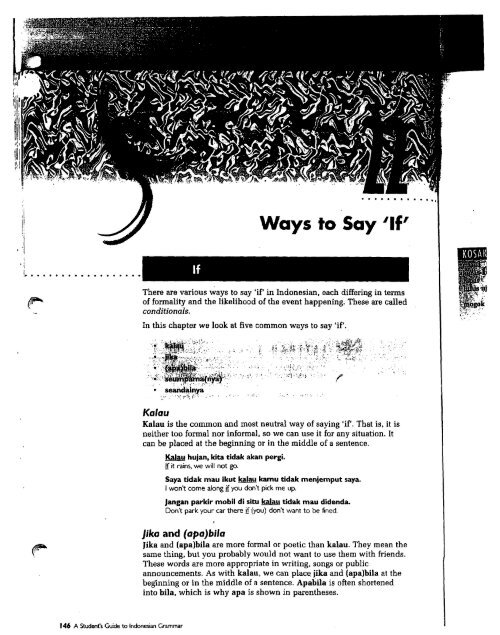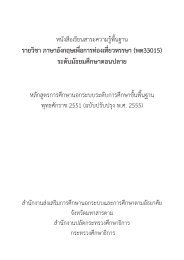bahasa indonesia
djenar-2003-a-students-guide-to-indonesian-grammar-oxford
djenar-2003-a-students-guide-to-indonesian-grammar-oxford
- No tags were found...
You also want an ePaper? Increase the reach of your titles
YUMPU automatically turns print PDFs into web optimized ePapers that Google loves.
Ways to Say 'If'<br />
There are various ways to say 'if in Indonesian. each differing in terms<br />
of formality and the likelihood of the event happening. These are called<br />
conditionals.<br />
In this chapter we look at five common ways to say 'if'.<br />
Kalou<br />
Kalau is the common and most neutral way of saying 'if. That is, it is<br />
neither too formal nor informal, so we can use it for any situation. It<br />
can be placed at the beginning or in the middle of a sentence.<br />
Kalau hujan, kita tidak akan pergi.<br />
If it rains, we will not go.<br />
-<br />
Says tidak mau ikut kalau kamu tidak menjemput saya.<br />
I won't come along if you don't pick me up.<br />
Jangan parkir mobil di situ kalau tidak mau didenda.<br />
Don't park your car there if (you) don't want to be fined.<br />
Jika and (apa)bila<br />
Jika and (apa)bila are more formal or poetic than kalau. They mean the<br />
same thing, but you probably would not want to use them with friends.<br />
These words are more appropriate in writing, songs or public<br />
announcements. As with kalau, we can place jika and (apa)bila at the<br />
beginning or in the middle of a sentence. Apabila is often shortened<br />
into bila, which is why apa is shown in parentheses.<br />
146 A Student's Guide to hdonesian Grammar



